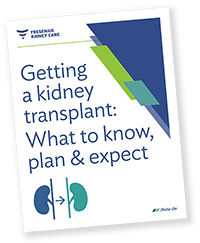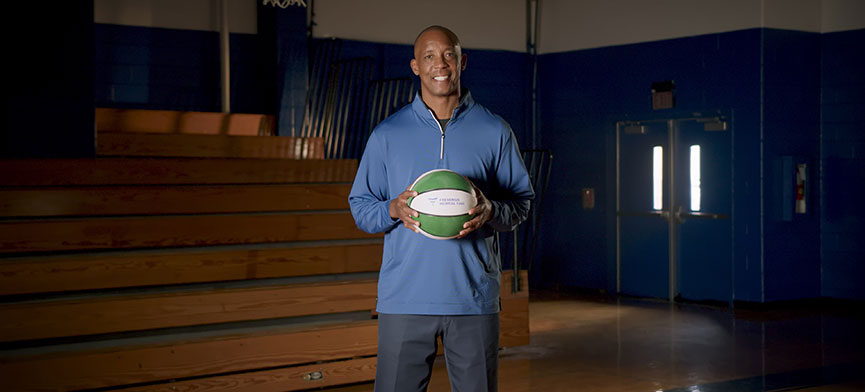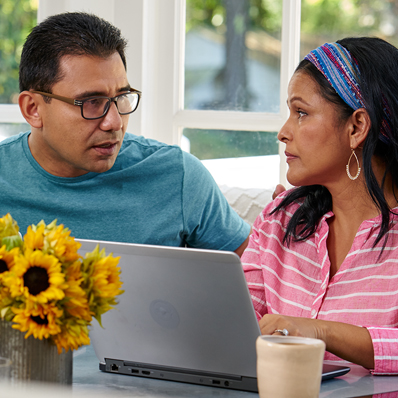Finding a Kidney Donor
Once your doctor has determined that you’re a good candidate for a kidney transplant you’ll need to be matched with a kidney donor who is compatible with you in tissue and blood type. There are several ways to go about finding a kidney donor.
- Talk to family and close friends about kidney donation. Because you’ll need to find a compatible kidney donor, a blood relative may be your best match—though a kidney could also come from a close friend, acquaintance, or co-worker. Talking openly about your donor search can help identify possible donors.
- Place your name on the kidney transplant waiting list to receive a donor kidney. Even if you might find a donor on your own, it’s important to register on the donor list as a backup. With today’s advanced donor-matching technology, it’s possible to find a good match with a living or deceased donor. For more information on how to get started, talk to your social worker.
- Register for a paired kidney exchange program. If you have a potential donor who turns out not to be a match for you, a paired kidney exchange program—sometimes called a kidney swap—can match pairs of recipients and their incompatible donors so that you each receive compatible kidneys.

What are the 2 types of kidney donation?
- Donation from a living kidney donor—a living donation is when a healthy kidney is surgically removed from a living kidney donor, leaving 1 healthy kidney intact. A person only needs 1 functioning kidney to live a healthy life. Kidney donation is the most common type of living organ donation.
- Donation from a deceased donor—a deceased donation is when a healthy kidney comes from an organ donor who is recently deceased.
How long will I be on the kidney transplant waitlist?
Once you register to be on the kidney transplant waitlist, there may be a considerable wait. There are approximately 95,000 people on the waitlist list and the average wait time for a deceased kidney is 3 to 5 years. You can get on the waitlist for a kidney transplant when your GFR is 20 or below—before kidney failure. The sooner you can get on the list, the better.
The United Network for Organ Sharing (UNOS) manages the national list of people waiting for an organ transplant. Transplants are generally more successful when the transport time for an available kidney to the transplant facility is as short as possible. So, the UNOS matching system also factors in the distance between donor and the transplant center when selecting a match. If you live in an area with access to more than one transplant center, it is recommended that you get screened and accepted at as many transplant centers as possible in order to have a greater chance of finding a kidney donor sooner. Different transplant centers have different requirements for accepting transplant patients.
Download a free guide to getting a kidney transplant
How does living donation work?
A living kidney donor will undergo complete medical tests to ensure that he or she is compatible with the kidney recipient and healthy enough for surgery. If surgery is cleared for both the donor and the recipient, and all kidney transplant match criteria is met, the donor will have a 2 to 3-hour surgery to remove 1 healthy kidney. That healthy kidney will then be transplanted into the recipient. When successful, living kidney donor transplants last an average of 15–20 years and may last longer.
What are kidney donor match criteria?
There are certain requirements for a kidney donor to be your match for a transplant. A living kidney donor must be in good physical and emotional health. You and your donor must also have:
- The same tissue type—aside from identical twins, no 2 people have the exact same tissue type, though a match is considered the “same” if tissues match 12 certain protein markers.
- Compatible blood type—certain blood types are compatible, meaning their antibodies won’t attack each other. An antibody is a blood protein formed when the body recognizes another substance as harmful.
- Negative serum crossmatch tests—this series of blood tests looks at the reaction between a kidney donor’s and a transplant recipient’s blood or organs. Negative test results mean there are no antibodies from the recipient’s blood that would destroy the donor’s.



Asking for a kidney donation
When you’re ready to start talking to family members, friends or acquaintances about considering the possibility of being a living kidney donor, here are some tips.
- Share your story. You may want to privately discuss your situation with close friends and relatives, or you may want to spread the word via social media. If you do choose to share on social, you may want to check your privacy settings to control your audience
- Explain the benefits of getting a kidney transplant. Let your loved ones know that a successful kidney transplant could give you a healthier, better quality, and possibly longer life.
- Prepare to answer questions. When people ask you what it means to be a living kidney donor, knowing the facts about becoming a kidney donor can help a potential donor understand what to expect—and help further the conversation.
- Be ready for any answer. Some people who want to donate a kidney may not be able to because of their health. Other people may say “no” for other reasons. Remember this decision isn’t a reflection of how that person feels about you.
- Stay positive in your search. Finding a kidney donor can take time. Get support and encouragement from your loved ones along the way. You can also talk to your social worker or another counselor if you have fears or concerns you want to talk through.

